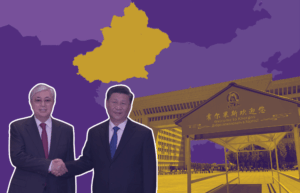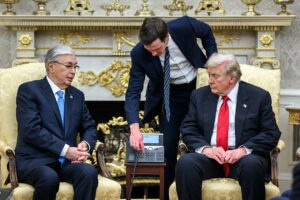For over a year now, the billion-dollar fraud case surrounding former tech CEO Sam Bankman-Fried has been causing an uproar. In Kazakhstan, too, the case caused a stir – mostly because of the Bankman-Fried’s connections to local businessmen. The Kazakh government is planning to regulate the industry more strictly: from January 2024, new guidelines on trading in digital assets will apply.
Steep rises can be followed by equally dramatic falls, especially in the world of cryptocurrencies. The industry experienced such a fall in November 2022 when FTX, the world’s second-largest trading platform for such assets, collapsed within a few days, taking several billion US dollars of investments with it. At the beginning of November 2023, the American federal court in Manhattan found Bankman-Fried guilty of embezzling the assets invested by customers of its crypto exchange FTX.
The sudden collapse was caused by revelations of dishonest business practices by the company’s management, above all by the CEO and co-founder Sam Bankman-Fried, who was once hailed as a child prodigy. At his behest, the hedge fund Alameda Research, a sister company closely linked to FTX, which he also co-founded and managed, had invested more than one billion US dollars from FTX investments in Kazakhstan. In turn, this contributed to the financial imbalance of the company network.
The scandal also made waves in Kazakhstan, where Alameda Research and other companies have fueled a veritable crypto boom in recent years. In response, the government is planning to regulate the promotion of and trade in cryptocurrencies more strictly.
Bitcoin rush in Kazakhstan
For FTX, Bankman-Fried requires enormous “mines” – industrial electricity and server farms the size of factory halls. The best conditions for building such mines were found in Kazakhstan at the end of the 2010s, where cheap electricity and relaxed regulations attracted many such projects. In 2021, Kazakhstan was the second largest Bitcoin producer in the world, with up to seven per cent of national energy production flowing into data centres at the peak of the Bitcoin frenzy. This is also where Bankman-Fried made his momentous investment. He had Alameda Research invest in Genesis Digital Assets (GDA), a company that is registered in Cyprus but operates primarily in Kazakhstan.
This Kazakh connection was reconstructed by the online portal Kursiv.media. GDA was founded in 2017 by the Kazakh investors Rashit Mahat, who worked on the board of directors of the telecommunications company Kcell between 2019 and 2021, and his business partners Abdumalik Mirahmedov and Andrei Kim. They joined forces with two German crypto specialists, Marco Krohn and Marco Streng, to get the company up and running.
Bankman-Fried joined the board of GDA in 2021. The money from Alameda flowed into a total of three data centres operated by GDA in Kazakhstan, where computer halls powered by cheap electricity generated coins that were later to be traded on Bankman-Fried’s exchange FTX. At least, that was the plan. By the beginning of 2022, Alameda had invested 1.1 billion USD in GDA – by far the hedge fund’s largest investment.
The beginning of the end for FTX
However, when the crypto market collapsed worldwide at the beginning of 2022, the value of the mining companies also fell massively. A venture that had seemed lucrative enough to risk more than a billion dollars just a few months previously now looked far less attractive. When the industry service CoinDesk also reported in November 2022 that Alameda Research’s core capital consisted of FTT, FTX’s platform-owned cryptocurrency, the situation worsened.
The almost uncontrolled growth of the industry in Kazakhstan was coming to an end at this point anyway. After the mass protests in January 2022, which in part were fueled by high energy prices, cheap energy for Bitcoin mining was no longer an option. In July 2022, a tax on electricity for mining projects was imposed.
The aim is to gradually regulate the industry and integrate it with state actors such as the Astana International Finance Centre (AIFC), a prestige project of the Kazakh government. In line with the external image of the AIFC, the country continues to see itself as a promising location for the digital industry. Yet, in the future, crypto start-ups will need to comply with certain framework conditions. The laissez-faire attitude that once attracted Bankman-Fried to Kazakhstan seems to be over for good.
Moving the mines
The regulatory efforts from 2022 were, at least in part, fueled by the sudden collapse of FTX. Following the CoinDesk report, the FTX and Alameda Research financial construction was exposed and confidence in the actual liquidity of Bankman-Fried’s company evaporated in one fell swoop. As a result, the industry leader and FTX’s biggest competitor, Binance, dumped its FTTs, causing the currency’s value to plummet – and Alameda Research and FTX with it.
GDA has relocated its data centres from Kazakhstan to the USA, where the company intends to continue its operations. New projects in North America and Sweden are now advertised on the company’s website, and former board member Bankman-Fried has completely disappeared from the company’s public image.
President Tokayev, who had even met with Bankman-Fried and other entrepreneurs in the industry at the end of 2021, finally issued the most far-reaching package of measures to date on crypto mining in Kazakhstan on 6 February 2023. According to kursiv.kz, these will come into force in January 2024.
New regulations, new investors
From now on, mines will require a state license to operate and will only be allowed to purchase electricity from the Kazakh grid if there is a surplus of electricity. From 2024, at least 50 per cent of the coins produced in Kazakhstan must also be traded via platforms registered with the Astana International Finance Centre. This quota is to rise to 75 per cent by 2025. The AIFC is not only intended to provide an attractive marketplace for the finance and tech industry but is also working on closer integration of the cryptocurrency sector with state authorities, as reported by the Astana Times.
Although the initial gold rush mood in the country is over, it will not be the last we hear of cryptocurrencies in Kazakhstan. Binance, the major competitor of the collapsed FTX, continues to work closely with the Kazakh government and is optimistic about the country. The company is already as well connected as GDA once was. In October 2022, Zhaslan Madiyev, until then Vice Minister for Digital Development, moved into a management position at Binance Kazakhstan.
Binance was founded in China, but currently has no official headquarters. The company is now working on crypto products that are linked to existing national currencies. The CBDC Digital Tenge, a crypto counterpart to Kazakhstan’s national currency, was run as a pilot project until December 2022 and is being prepared for a broader market launch. The new currency should be available nationwide by 2025.
For more news and analysis from Central Asia, follow us on Twitter, Facebook, Telegram, Linkedin or Instagram.
 Cleaning up after FTX: Kazakhstan aims to regulate the crypto industry
Cleaning up after FTX: Kazakhstan aims to regulate the crypto industry 



